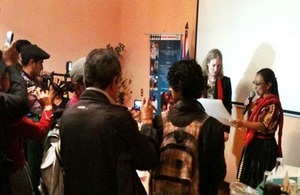British Embassy participates in forum on the health of Indigenous Women
The event, held in a hotel in the city of Quetzaltenango, was held to publicize the gaps faced by Indigenous Women in achieving their health rights, as well as to promote the efforts of British actors, including the British Embassy, in improving maternal health and tackling violence against women in the country

British Ambassador in Quetzaltenango
The activity was organized by Health Poverty Action, a British NGO which has been working in Guatemala for 19 years. Its focus has been on health rights, with emphasis on the most vulnerable populations. It has extensive experience in the cultural adaptation of health systems in Peru and Nicaragua, as well as Africa and Asia.
At the event HPA presented a summary of their work in Guatemala, and highlighted a survey carried out on the current situation faced by Indigenous Women. The event also focused on the experience of a project on Violence against Women recently undertaken with the support of the British Embassy in Guatemala, as well as plans for the implementation of a new project funded by the UK’s Big Lottery Fund.
HPA Guatemala has prioritized women’s health rights, having implemented with its local partner, Nuevos Horizontes Association, initiatives aimed at preventing Violence against Women, funded by the British Embassy in Guatemala, AusAID and others.
Currently, with funding from the UK’s Big Lottery Fund, HPA and the Nuevos Horizontes Association are launching their Maya Mothers and Children Project, focusing on culturally appropriate maternal and new-born health services, with pilots in two health districts in Totonicapán (Santa Lucia la Reforma and Momostenango) and in Quetzaltenango (Cabricán and San Carlos Sija).
Maya Mothers and Children seeks to:
- Increase community access to Reproductive Health, Maternal Health and that of the New-born (RMNH)
- Create culturally appropriate quality health services
- Improve accountability of RMNH services and improved access to health rights
- Advocate evidence-based culturally appropriate interventions to improve the health status of indigenous people.
The event was attended by Sarah Dickson, British Ambassador in Guatemala, representatives of the Ministry of Health, local government, Nuevos Horizontes Association, the Sexual and Reproductive Health, Education and Nutrition Observatory, the Network of Indigenous Women for Sexual and Reproductive Health, Education and Nutrition, as well as other civil society and state actors committed to improving Maya women’s health.
Health Status of Indigenous Women:
- According to the Sexual and Reproductive Health Observatory, maternal mortality is three times higher for indigenous than non-indigenous women
- According to the most recent Survey of Mother and Child Health in Guatemala, 54% of non-indigenous women use modern contraceptive methods, compared with only 28% of indigenous women
- The same survey reports unmet demand for birth spacing or limiting the number of births of 15% for non-indigenous women, but 30% for indigenous women
- The 2013 report of the International Working Group on Indigenous Affairs notes that life expectancy for the indigenous population is on average 13 years lower than that of the non-indigenous population
- A study undertaken by Health Poverty Action in eight indigenous municipalities in Guatemala reveals that 80% of adult Maya women have suffered some kind of violence during their lifetime.
Barriers for indigenous women in having access to health services include:
- The lack of use of their maternal language in health establishments
- The lack of inclusion in health establishments of traditional community practices such as vertical birth
- The lack of community participation in the design and monitoring of health services
However, Guatemala has made important advances in its legal framework for culturally appropriate health services:
- The 2010 Health Maternity Law and its regulations assures the right to be attended in one’s maternal language, as does the 2003 National Languages Law
- The establishment in 2009 of the Ministry of Health’s Intercultural Attention Unit
- The country’s Health Code establishes the community’s right and responsibility to participate in the partial or complete administration of health programmes and services.